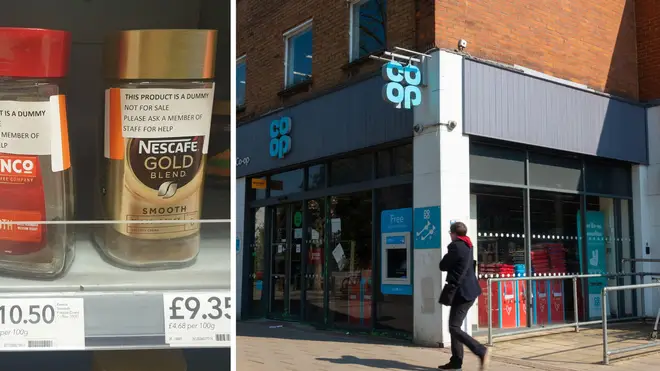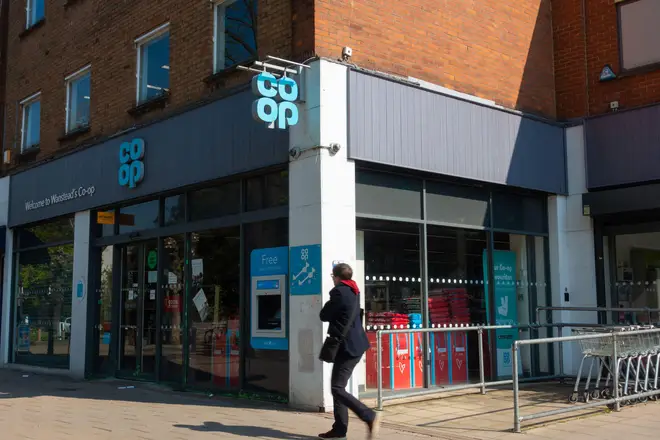
Nick Ferrari 7am - 10am
30 May 2023, 11:31 | Updated: 31 May 2023, 00:42

A supermarket has resorted to putting dummy jars of instant coffee on shelves to deter shoplifters during the cost-of-living crisis.
A Londoner shared a picture of her local co-op selling jars of Kenco Smooth instant coffee and Nescafe Gold Blend.
The jars have been slapped with a label reading “This product is a dummy. Not for sale. Please ask a member of staff for help.”
The Kenco Smooth costs £10.50 for a 200g jar and the Nescafe Gold £9.35 for the same size.
The picture was posted online with the caption: “cost of living reaching new heights, my local co-op is now a grocery show room. also ft periodic tannoy announcements from mitie security that their cameras are watching you. bleak af.
Supermarket price rises hit all time high in May, although food inflation drops slightly
Listen and subscribe to Unprecedented: Inside Downing Street on Global Player

“Lots of ppl obsessing over these prices.. I'd never pay a tenner for this either, but surely what's more alarming is the sudden need for this insane securitisation, a function of rising poverty.”
But there were signs today that the rapidly rising increase in the price of food may have reached its peak as a survey of prices in shops suggested they fell between April and May.
Food inflation fell to 15.4% in the year to May, according to a survey by the British Retail Consortium (BRC) and Nielsen.
It was down from 15.7% in April.
It is still an incredibly high figure, meaning that a person who spent around £20 in a food shop a year ago would now be paying a little over £23 for the same items.
This is an average so the exact number would depend on what they bought.
Although May's figure is a little lower than the food inflation seen in April, it is still the second fastest annual increase the BRC has ever measured, it said.
It added that the price of fresh food increased by 17.2% in the year to May, down from 17.8% in April.
However, ambient food inflation - that is to say shelf-stable items that can be stored at room temperature - rose from 12.9% in April to 13.1% in May.
Overall inflation in shops rose from 8.8% to 9% between April and May, the BRC said, an all-time high.
"While overall shop price inflation rose slightly in May, households will welcome food inflation beginning to fall," said BRC chief executive Helen Dickinson.
"The slow in inflation was largely driven by lower energy and commodity costs starting to filter through to lower prices of some staples including butter, milk, fruit and fish.
"Conversely, the price of chocolate and coffee rose off the back of the ongoing high global costs for these commodities. While non-food inflation rose, consumers are benefiting from heavy discounts in footwear as well as books and home entertainment.
"Fierce competition between supermarkets has helped keep British food among the cheapest of the large European economies.
"While there is reason to believe that food inflation might be peaking, it is vital that Government does not hamper this early progress by piling more costs onto retailers and forcing up the cost of goods even further.
"The biggest risk comes from policies such as the incoming border checks and reforms to packaging recycling fees."
Mike Watkins, head of retailer and business insight at NielsenIQ, said: "To help mitigate the impact of inflation, shoppers are saving money by looking for seasonal promotions on the high street and taking advantage of the price reductions offered by supermarket loyalty schemes.
"Food retailing in particular is competitive, so hopefully the recent price cuts in fresh foods is a sign that inflation has now peaked, albeit ambient inflation may take a little while longer to slow."